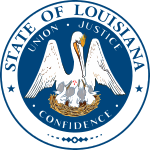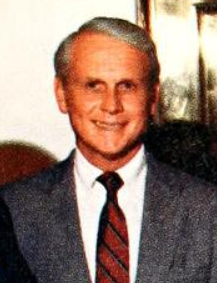
David Conner Treen Sr. was an American politician and attorney from Louisiana. A member of the Republican Party, Treen served as U.S. Representative for Louisiana's 3rd congressional district from 1973 to 1980 and Governor of Louisiana from 1980 to 1984. Treen was the first Republican elected to both offices since Reconstruction.

Piyush "Bobby" Jindal is an American politician who served as the 55th Governor of Louisiana from 2008 to 2016. The only living former Louisiana governor, Jindal also served as a member of the U.S. House of Representatives and Chairman of the Republican Governors Association.

John Leigh "Jay" Dardenne, Jr. is an American lawyer and politician from Baton Rouge, Louisiana, who is serving as commissioner of administration for Democratic Governor John Bel Edwards. A Republican, Dardenne served as the 53rd lieutenant governor of his state from 2010 to 2016. Running as a Republican, he won a special election for lieutenant governor held in conjunction with the regular November 2, 2010 general election. At the time, Dardenne was Louisiana secretary of state. Formerly, Dardenne was a member of the Louisiana State Senate for the Baton Rouge suburbs, a position he filled from 1992 until his election as secretary of state on September 30, 2006.

Bourbon Democrat was a term used in the United States in the later 19th century (1872–1904) to refer to members of the Democratic Party who were ideologically aligned with fiscal conservatism or classical liberalism, especially those who supported presidential candidates Charles O'Conor in 1872, Samuel J. Tilden in 1876, President Grover Cleveland in 1884, 1888, and 1892 and Alton B. Parker in 1904.
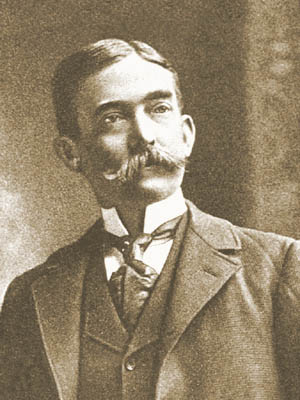
William Wright Heard was the 32nd Governor of Louisiana from 1900 to 1904. His governorship saw the start of the Louisiana's oil and gas industry.

The 1928 Louisiana gubernatorial election was held on April 17, 1928. Like in most Southern states between the Reconstruction era and the civil rights movement, Louisiana's Republican Party was virtually nonexistent in terms of electoral support. This meant that the Democratic primary held on January 17 was essentially the real contest to decide the governor, as winning the Democratic nomination would be tantamount to election as governor.

The 1924 Louisiana gubernatorial election was held in two rounds on January 15 and February 19, 1924. Like most Southern states between the Reconstruction Era and the Civil Rights Movement, Louisiana's Republican Party was virtually nonexistent in terms of electoral support. This meant that the two Democratic Party primaries held on these dates were the real contest over who would be governor. The 1924 election saw Henry L. Fuqua defeat Hewitt Bouanchaud to become Governor of Louisiana, and saw the beginning of the political rise of Huey P. Long, who came in a surprisingly strong third.

The 1920 Louisiana gubernatorial election was held on April 20, 1920. Like most Southern states between the Reconstruction Era and the Civil Rights Movement, Louisiana's Republican Party had virtually no electoral support. This meant that the Democratic Party primary held on January 20 was the real contest over who would be governor. The election resulted in the election of John M. Parker as governor of Louisiana.
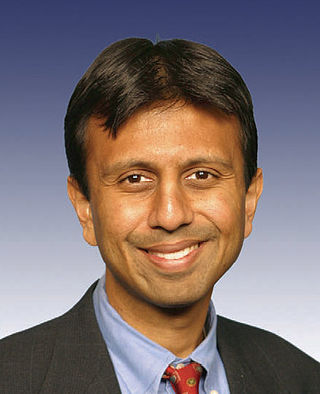
The 2007 Louisiana gubernatorial election was held on October 20. The filing deadline for candidates was September 6. On the day of the election, all 12 candidates competed in an open jungle primary. Bobby Jindal won the election with 54%. This was the first time since 1967 in which the winner of a Louisiana gubernatorial election was of the same party as the incumbent president.

Jared Young Sanders Sr. was an American journalist and attorney from Franklin, the seat of St. Mary Parish in south Louisiana, who served as his state's House Speaker (1900–1904), lieutenant governor (1904–1908), the 34th Governor (1908–1912), and U.S. representative (1917–1921). Near the end of his political career he was a part of the anti-Long faction within the Louisiana Democratic Party. Huey Pierce Long Jr., in fact had once grappled with Sanders in the lobby of the Roosevelt Hotel in New Orleans.

The 1894–95 United States Senate elections to the 54th Congress resulted in plurality control of the Senate by the Republican Party with Populist and Silver support.

The 1904–05 United States Senate elections were elections that coincided with President Theodore Roosevelt's landslide election to a full term and the 1904 House of Representatives elections. Party share of seats remained roughly the same, when including vacancies and appointments, and the Republicans retained a significant majority over the Democrats.

The 1908 Louisiana gubernatorial election was held on April 21, 1908. Like most Southern states between Reconstruction and the civil rights era, Louisiana's Republican Party had minimal electoral support because of the mass disenfranchisement of African Americans. This meant that the Democratic Party primary held on January 28 was the most important contest to determine who would be governor. This election marked the first time Louisiana used primaries to nominate party nominees. Republicans nominated Henry Newton Pharr, son of the party's 1896 nominee, John Newton Pharr. The election resulted in the election of Democrat Jared Y. Sanders Sr. as governor of Louisiana.

The 1900 Louisiana gubernatorial election was held on April 17, 1900. This was the first state election after the adoption of Louisiana's 1898 constitution, which disenfranchised nearly all of the state's Black voters, who had been the core supporters of the Republican Party. The constitution had been prompted by the unusually strong voter support for Republicans and Populists in the 1896 Louisiana gubernatorial election.

The 1896 Louisiana gubernatorial election was held on April 21, 1896. Like most Southern states between Reconstruction and the civil rights era, Louisiana's Republican Party was virtually nonexistent in terms of electoral support. As Louisiana had not yet adopted party primaries, this meant that the Democratic Party convention nomination vote was supposed to be the real contest over who would be governor. However, the Republicans and Populists put forward a joint candidate, John N. Pharr. With combined Republican and Populist support Pharr garnered 43% of the vote, although the Democratic nominee, Murphy J. Foster was elected with 57% of the vote.

The 1892 Louisiana gubernatorial election was held on April 19, 1892. Like most Southern states between Reconstruction and the civil rights era, Louisiana's Republican Party was virtually nonexistent in terms of electoral support. In addition, the Republican Party had split into two factions, each supporting a different candidate. As Louisiana had not yet adopted party primaries, this meant that the Democratic Party convention nomination vote was supposed to be the real contest over who would be governor. At the convention, pro-lottery former Governor Samuel D. McEnery was nominated. As a result of the nomination of a pro-lottery candidate, a group of anti-lottery Democrats nominated their own candidate, State Senator Murphy J. Foster. In addition to the four candidates already mentioned, the increasingly popular Populists nominated R. H. Tannehill and their candidate. Despite all of this, Senator Foster was elected with 45% of the vote with a comfortable 19% margin between him and McEnery, who placed second. This election marked the last time until 1979 that the official Democratic Party nominee was defeated.

A general election was held in the U.S. state of Louisiana on October 24, 2015. All of Louisiana's executive officers, and both houses of the Louisiana State Legislature were up for election. Under Louisiana's jungle primary system, all candidates appeared on the same ballot, regardless of party and voters voted for any candidate, regardless of their party affiliation. Since no candidate received a majority of the vote during the primary election, a runoff election was held on November 21, 2015 between the top two candidates in the primary. Louisiana is the only state that has a jungle primary system.
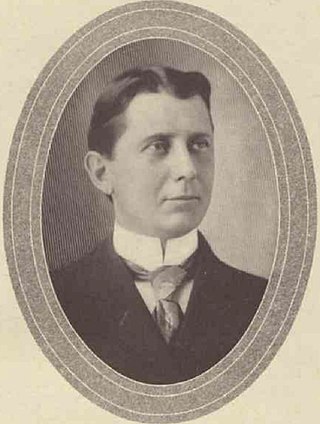
Ruffin Golson Pleasant was the 36th Governor of Louisiana from 1916 to 1920, who is remembered for having mobilized his state for World War I. Prior to his governorship, Pleasant was the Louisiana attorney general from 1912 to 1916 and the city attorney of Shreveport from 1902 to 1908.

The 2023 Louisiana gubernatorial election will take place on October 14, 2023, to elect the next Governor of Louisiana. Incumbent Democratic Governor John Bel Edwards will be ineligible to seek a third consecutive term due to Louisiana's term limits.
